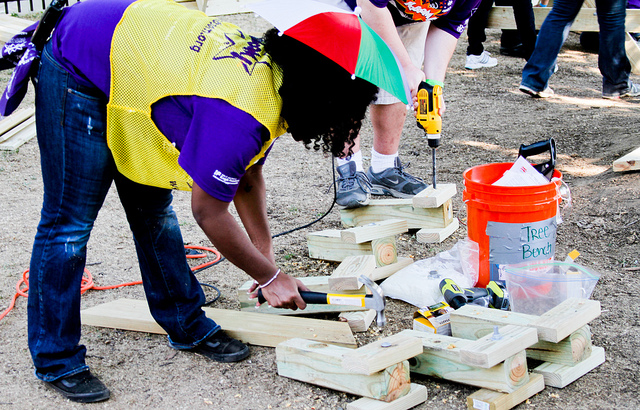
Taking small steps for large-scale community change
Knight Foundation this week announced support for four projects that use technology to empower communties, including DailyFeats, a site known for helping people set small goals to achieve big things. Here, Markus Kolic, director of content and projects at DailyFeats writes about the project.
Everyone has goals in their lives. Some of us are trying to lose weight; some to save more money; some to reduce job stress and spend more time with our families; some of us, all of the above.
But turning those goals into concrete steps, and putting them into practice in our lives, is super hard. We’ve all experienced this. It’s one thing to resolve to lose ten pounds — it’s quite another to say no to a tempting chocolate muffin on a busy afternoon. The gulf between our long-term goals and our immediate, instinctual preferences is just too large. (To learn more about this phenomenon, read up on the economic principle of hyperbolic discounting.)
To solve this problem, DailyFeats — a project my colleagues and I have been working on here in Cambridge, Mass. since 2010 — helps people connect those daily steps to their long-term goals. Using the DailyFeats mobile and Web apps, you can see how your daily decisions add up to bigger change: through a system of tracking and points (which you can actually redeem for rewards or donations), you can boost your motivation and work your way toward your goals.
Now with Knight Foundation funds we’ll be putting an extra emphasis on using this model to encourage community change.
We want to know: is it possible that the same process that helps someone go to the gym more often might also help them be better citizens? Can we encourage people to read up on politics, or help out a food bank, or explore the arts, effectively and consistently through DailyFeats?
We think we can, and we’re going to test that theory out through several targeted research projects. Over the coming months we’re going to encourage several targeted groups of people to engage with their communities, using the tools and incentives that DailyFeats has built; then, we’ll measure the results.
We’ll be doing a detailed data analysis too. DailyFeats records the day-by-day actions that people do, at enormous scale, so we can use statistical methods to compare the activities of volunteers to non-volunteers (for example) and see if our outreach has made an impact.
We can even measure whether specific kinds of actions, that could seem on the surface totally unrelated, make a difference: whether someone who goes to the gym in the morning is more apt to volunteer on the weekend, or whether a person who drinks orange juice is more likely to vote. I’m not sure if we’ll find some kind of magical Butterfly Effect relationship like that: we can’t know, because until now it’s never been tried.
We’re not the only people trying this, of course. A lot of theorists, engineers, and entrepreneurs are staking bets today on the power of the quantified self. Internet technology — the same technology that brings us adorable kittens and Gangnam Style — can gather and interconnect information in minutes that, not long ago, would have taken academic research teams decades of work to assemble. It’s a big deal. We’re not sure where the research will lead us, and our work is only a small part of it, but we’re pretty confident that it’ll provide new insights into how we can help people change their behavior on a mass scale, and thereby create once-unimaginable solutions that improve our lives and communities.
More about Knight Foundation’s Tech for Engagement Initiative in our new report, Digital Citizenship.
Recent Content
-
Communitiesarticle ·
-
Communitiesarticle ·
-
Communitiesarticle ·


